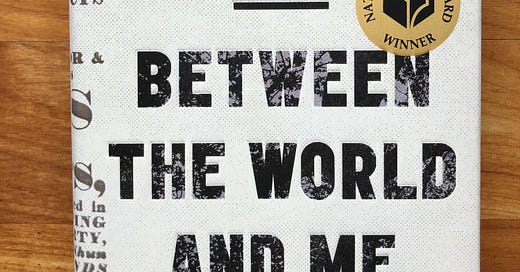This reads like a work of poetry, perhaps that's why I couldn't stop until I was finished. Ta-Nehisi wrote this as a letter to his son. It is his reflection about being black in the United States. This is a product of clear thinking and deep reflection.
A wise elderly man once told me that when I have kids my calculation about the world will change, I honestly don't know how, but I can see that it did change Ta-Nehisi's life.
In this reflection, Ta-Nehisi speaks with a vast knowledge of history. He was not writing as one who was not aware at all. He was writing a painful recollection of the past, of himself, his family, and his race. There are some today in the United States that want any discussions about race to be forgotten completely. It is as though they are saying "Forget about the past. It is not important", but the reality of the descendants of men and women who were enslaved in the US cannot be pushed away. And Ta-Nehisi is one of those descendants. Discussions about race can be all intellectual and statistics, however, behind each statistic is a human face with a family and a history. The first step towards any redemption or change is acknowledging that there is (was) a wrong.
Ta Nehisi insists, and rightly, that each individual confronts the world from the history that he or she has come from.
I took several notes from this.
"And still I urge you to struggle. Struggle for the memory of your ancestors. Struggle for wisdom. Struggle for the warmth of The Mecca. "
By "The Mecca", Ta Nehisi was referring to a sort of an intellectual pilgrimage in which a person's worldview is developed. His own happened at Howard University, from which he didn't obtain his degree. He was a regular user of the library and it was there that he had intercourse with history that changed his life forever. There he met several of his heroes, and like Malcolm X, one of his favorite heroes, he was transformed from the inside out. Education is liberating. He wrote that he was made for the library, not the classroom, the library allowed him to investigate whatever he wanted to investigate.
A very touching story for me was when Ta Nehisi went to Paris and was supposed to be guided by a man who only wanted to help him. Ta Nehisi was conscious of his experience as a black man in America, it raised his guard. He refused to let the man put him in front, fearing that he will be hit. He also refused to enjoy the food they had together, fearing it was all deceit. In the end, he saw that his life was guided by the experience he has had in his city. He explained to his son that he doesn't hope the same for him.
And here is the problem, reading this book, one will think Ta Nehisi was too bleak and a pessimist, but deep down, it was because he was an optimist that he wrote this. Despite our experiences, I notice that human beings cannot live without hope. Despite his strong criticism of the United States, he believed that things will be better for his son, he didn't have to say it, he knew it and that was why he wrote this letter to his son.
This is a good reflection for several things, on the father-son relationship, on race in America, and importantly on transitions.
Thank you Rhoda Nanre Nafziger for recommending/sending this. Deeply enjoyed it. I look forward to exploring the rest.





Between the World and Me was one of my favorite books. It got me started down a lot of other reads, like James Baldwin's The Fire Next Time and WEB Du Bois's The Souls of Black Folk!
I would certainly read this book.
Nice job, Lengdung.